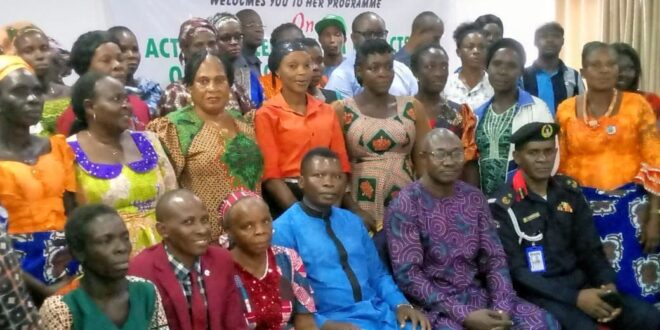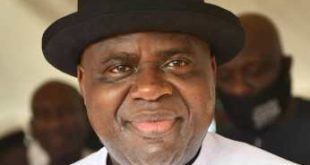By Amos Odhe, Yenagoa
A non-governmental organisation, Stakeholders Alliance for Corporate Accountability (SACA), has intensified campaign against oil spills in the Niger Delta region.
The NGO which was founded by a Catholic priest, Rev. Fr. Kevin O’Hara, organized an enlightenment, sensitization and training programme for women in Bayelsa State.
The programme tagged, ‘Action Reflection On Impacts of Oil Spillages and Human Rights,’ brought together women leaders from 20 rural communities in Bayelsa State to reflect and share experiences on actions they are taking to reduce crude oil spillages and its associated risks to the environment and human beings in their respective communities.
Our reporter gathered that SACA is funded by Misean Cara of the Republic of Ireland and the St. Patrick’s Missionary Society (SPS) of the Catholic Church.
In his opening remarks, executive director of SACA, Mr Kingsley Ozegbe said the rationale behind the event was to further take the engagement on the dangers of oil spills to the rural communities through women.
He said that the event was exclusively focused on women because they are worst hit by hazards linked to exposure to crude oil spills, emphasizing that any harm on children, husband, wards and the communities directly weighs women down as such increases their burden to care for the sick and grief when death occurs.
Ozegbe stressed that women are more emotionally stressed than men when their loved ones are sick or dies.
Our reporter also learnt that the programme was organized by the NGO as part of the United Nations Guiding Principles on Business and Human Rights (UNGP) which is an instrument that consist 31 principles that the UN adopted to protect the rights of citizens, hold all companies and governments to account to respect and remedy human rights abuses/violations as they conduct their business.
While cautioning against third party interference on oil and gas installations, Ozegbe expressed regrets that available data indicated that a large percentage of spillages in the Niger Delta region were caused by individuals and groups interfering with oil facilities, thereby posing serious harm to the environment and people in communities and their sources of livelihood, adding that SACA has been saddled with this since its inception “and will not relent.”
The SACA boss said: “A recent research carried out by Roland Hodler and Anna Bruederle of the University of St. Gallen, Switzerland on the effects of oil spillages in Nigeria showed that anyone who lives 10km away from the site of any oil spill is likely going to be affected by the hazardous impact of the spills.
“We’ve today invited women from 20 communities across the 8 LGAs of Bayelsa State to further enlighten them on the effects of oil spillages. We invited women because they’re the worst hit by these effects.
“It’s widely reported that continuous exposure to crude oil spills causes miscarriage, still birth, deforms children and several neonatal challenges”.
The NGO’s boss added that clinical investigation in Rivers State on persons directly involved in unregulated processing of crude oil, transporting and selling of the products in local communities showed that they have traces of petroleum in their urine and blood, thus, increasing the likelihood of high incidence of cancer and other ailments amongst youths and women in the region.
In a presentation tagged, ‘Impact of Crude Oil Spill on Environment, Health, Food Security and Food Safety’, key resource person, Dr Briggs Bieye Renner of the University of Port Harcourt, Rivers State re-emphasized the negative impacts of oil spills.
He identified exposure routes of crude oil to humans as oral ingestion of food and water contaminated by it, inhalation of contaminated air, and dermal contacts by bathing water contaminated with crude oil or mixing crude oil with body lotions/creams, amongst others.
Briggs noted that incomplete combustion of crude oil is a great source of air pollution in the region.
The resource person advised communities affected by crude oil pollution to put pressure on individuals and oil companies to stop further pollution and strongly demand for remediation of all crude oil impacted sites before the multinational companies divest their onshore assets.
He said: “Affected communities and people must begin to protect their livelihoods from crude oil spills, and demand for payment of adequate compensation in accordance international best practices”.
Other resource persons who made presentations include, the Programme Manager of SACA, Mr Augustine Anyio; the Director of Petroleum and Pollution, Bayelsa State Ministry of Environment, Eng. Reuben Enai and the Director of Public Health of the Bayelsa State Ministry of Health, Dr. Jones Stow paper dwelt on health effects of oil spillage on human, children, pregnancy and adults.
Presentations were also made by the Director of Agricultural Services, Bayelsa State Ministry of Agriculture and Natural Resources, Mrs. Sarah Udisi, the Public Relations Officer of the Bayelsa State Command of the Nigeria Security and Civil Defense Corps (NSCDC), Diri Ogbere.
Ogbere urged the public to volunteer information that could unravel any attack on critical assets and infrastructure, which is the mandate of the NSCDC, adding that “We need vital information and we are prepared to keep them confidentially.”
Head of Legal and Enforcement, National Human Rights Commission, Barr. Vinning Goselle, however noted that they are saddle with enforcement of due diligence to safeguard against human abuses.
While goodwill message was delivered by the Bayelsa State coordinator of the National Human Rights Commission, Dr. Eugene Baadom.
 PH Mundial – Port Harcourt Online Newspaper News Across The Region
PH Mundial – Port Harcourt Online Newspaper News Across The Region





